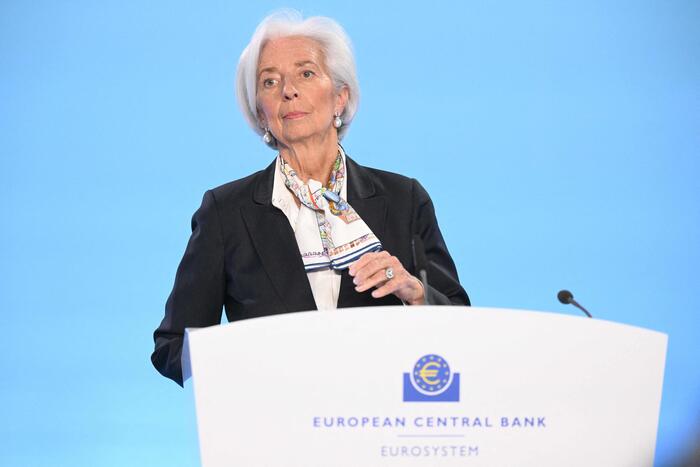column
For years now there has been a lot of excitement in German euro countries. And so far the pathogen was always called Mario Draghi - the man who supposedly expropriates our poor savers and senselessly lets money flow into the financial system by having all kinds of government and private bonds bought. And which one or the other bank customer recently even owed savings on. Is it [called.
Now the old Draghi is gone, the new one is called Christine Lagarde, and yesterday she announced that she would rethink the strategy.
Is there now an end to negative interest rates and floods of money? Rather unlikely. The change should be an opportunity to think about a completely different coup - and no longer send money into the financial system, but to people like you and me who would spend it too. And maybe even save the climate.
One of the rubbish ideas that are so rampant in Germany is that the euro central bank is to blame for the low interest rates per se. The rates are so low outside the euro area, almost everywhere in the world. And word has gotten around among the somewhat more serious experts that there are very real reasons for this: there is too much savings with too little demand for money
- because too little has been invested in the economy for years,
- States less to no new debt,
- there are too many empires
- the rich save and can no longer spend their money at all
- and since the great financial crisis, too much has simply been saved;
- also because balance sheets are cleaned up
- and the prospects of investing seem rather shaky.
This is where supply and demand work. Result: zero interest.
None of this would be better if the new euro boss raised the key interest rate by decree against all economic trends. If in doubt, it would only exacerbate the problems. Because it would save even more - and invest even less. A gaga recipe. Rather irritating that someone like critic Bundesbank chief Jens Weidmann makes so little effort to educate the Germans about it - and instead provides food for the agitation of the "Bild" newspaper.
The correct thing about the criticism is that it seems to be of limited help if the ECB gods buy government and private bonds worth tens of billions a month to save them, as they have been doing since 2015. It was thought like this: If the ECB buys bonds, the providers of the bonds have more money that they can then lend to people who spend it. Which stimulates the economy, invests more and saves less. And interest rates rise again. Problem solved.
The catch: A significant part of the beautiful money seems to be lost on the way to the real world. There is some reason to believe that the banks as intermediaries - instead of financing investments in the real economy - tend to use the money to buy shares. Which, in turn, could explain why prices and property prices have skyrocketed in recent years despite relatively slow economic growth - while relatively little has been invested in the real economy. It is not entirely clear how very low interest rates actually contributed to this. If they were a major cause, the debt ratios would have had to skyrocket. So far they are not.
How do you get more money?
If the problems lie here, critics are quite right that an increase in purchases is not (necessarily) the solution - especially since the interest rates are now not only low, but negative, even for small savers. This is difficult to convey in the long run.
Except that it would not be a solution if Madame Lagarde, as a nice innovation, simply stopped buying bonds now - and tried to push through higher interest rates against supply and demand. See above. The result would most likely be a (real) recession. How unstable the situation is has already been shown this year, when the German economy came quite to the brink of recession. And even the dear savers don't have that much. Some are more likely to become ex-savers because the financial basis for saving money is lost through dismissal or loss of salary.
Instead of curing zero interest on the symptom, the problem could be solved in a completely different way. But that would not be in the sense of old German orthodoxy (to put it mildly). If the basic diagnosis is correct that recession and deflation spurts are more likely without intervention, but too little money has really reached the real economy in the past, then it is worth thinking about how more money will arrive.
Helicopter Money Project
Small mind game: if the euro central bank had distributed the approximately 2.6 trillion euros that it has invested in the purchase of bonds since 2015 fairly to each of the approximately 340 million euro citizens and sent them, each of us would have said and since then get 7500 euros. And since then a large part would not have been in stocks but in the purchase of real goods. What would have stimulated the economy to invest significantly more if something like this came in a steady flow than is the case with creating money via the financial world.
The project with the brisk technical term "helicopter money" could still be expanded in terms of its usefulness - why the checks, which are then distributed in this way, are not linked to the fact that climate-friendly investments in electric cars, hyper-efficient refrigerators or solar roofs are (also) financed with them? Which would not only be very nice for the environment (all the more natural if the helicopters were electric). It could also ensure that the money is spent - and does not go under the pillow.
More at SPIEGEL +
Then the economy would invest more, there would be less savings and more money demand, which would automatically increase the price of money. No more crisis. No more negative interest. Gift box instead of saver's coffin. Who could say no?
Well, the Bundesbank, for whom something is about as acceptable as the plague, because a central bank should, according to the old teaching, not get involved in politics and handle public money. The very idea should trigger a racing heart in the grail guards of the political order. The only question is whether the times still fit their old good weather principles.
The fact that a Bundesbank does not have to interfere in fiscal policy issues or even save the world comes from times when economists were still thinking that the economy and finance always work best when nobody intervenes - and markets end up getting better and better know what's going on. And where central banks only occasionally had to adjust their key interest rates a little when inflation turned out to be slightly higher or lower than previously thought. Back then, environmental concerns were about cleaning the Rhine. Cute.
The financial system is latent to acutely dysfunctional
The reality today is that the experiment of a world in which everything regulates itself and all of its tasks share beautifully has failed - at least since the near collapse in 2008. The financial system has since been latent to acutely dysfunctional - unable to put the money in to steer a lot more meaningful real projects. Which is why there are still so crises of abnormally low interest rates. So it is still and again and again about preventing the next big crash.
Crazy. Of course, what a central bank does has an impact on the economy and the labor market, either way. And the financial system. And on savers. And on the climate.
It is somewhat politically and humanly grotesque when in these times a continental institution like the European Central Bank spends higher double-digit billions every month without even having the slightest aspiration to use the money to solve the rather acute problems of our world. If, on the other hand, governments keep waving away when it comes to solving these problems - because they supposedly don't have the money to invest a lot more in the climate, schools, rail networks or digital.
Time for a very fundamental debate.














